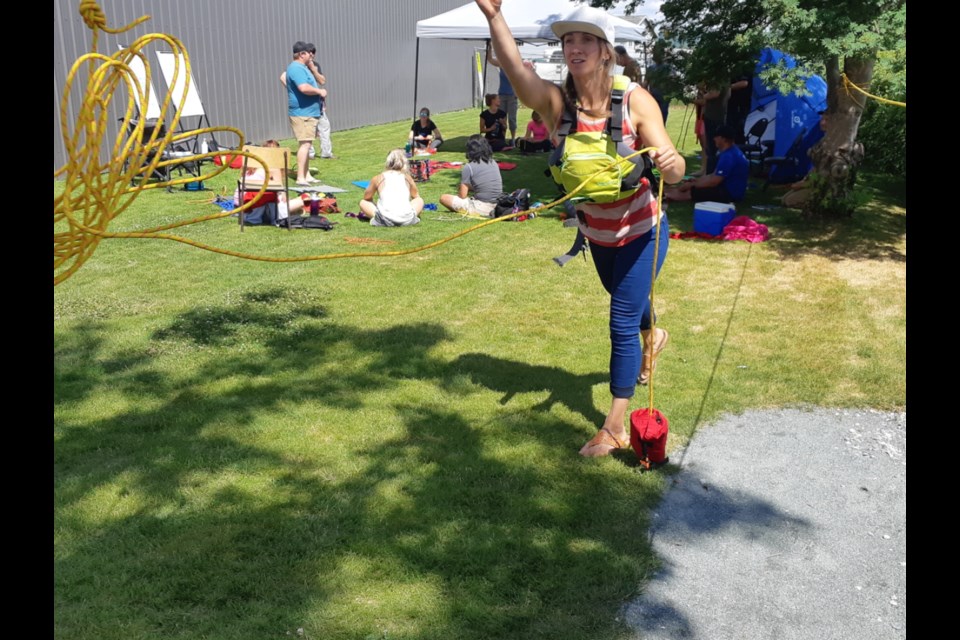About five years ago, Kimberley Kenyon and her group of paddlers were just about to pull out of the Willow River when they saw the man and his two dogs stranded downstream on the last piece of land before an impassable canyon.
One of his dogs had gotten into the river to chase a bird and was briefly swept away and the other dog followed. The man managed to get himself and both pets out of the water and on to the island, but they were certainly not out of danger.
Just ahead around the next bend, not far from the Highway 16 bridge, was the notorious canyon with its steep sides and huge boulders that churns the river into a death trap that on May 10, 1974 took the lives of eight teenaged boys.
“By sheer luck on that day on the Willow River we actually had a raft with us, so we were able to stop, create a plan, paddle over to the individual and still make the last takeout out before what we refer to as Killer Canyon,” said Kenyon.
“He’d been there about 40 minutes before we actually got to him. Thankfully, for the crew that we had, most of us had swiftwater (rescue) training. I did not, at the time, so I was able to witness what it meant to work as a group with training to help an individual.”
They got the man and his dogs into the raft and they made it safely back to the shore without having to call in a search and rescue team.
Kenyon was among a group of 17 paddlers, fisheries biologists and conservation officers who sighed up for the OVERhang Climbing Gym’s Swiftwater Safety & Rescue course over the weekend. The 35-year-old Prince George native started a business last year – Born to Board – that teaches people how to navigate stand-up paddle boards on rivers and lakes.
Kenyon has a background in surfing, on Vancouver Island and in Vietnam and Mexico. She moved back to landlocked Prince George and started whitewater stand-up paddleboarding eight years ago and she’s also learning how to surf in the rivers, working with resident expert Andrew Cline. Cline amazed onlookers a few years ago when he completed the Two Rivers Canoe Race from Ilse Pierre to Prince George on his stand-up paddleboard.
Kenyon is a Paddle Canada certified instructor who works full-time for Canfor Pulp as an instrument mechanic and she uses her time off to teach stand-up paddleboard classes. She’s a sponsored athlete with the Badfish SUP team and some of her daring exploits on river rapids are depicted in videos on her website, borntoboard.ca. There’s potential for guided expedition trips and she hopes to utilize the swiftwater playgrounds in and around Prince George to tap into the tourism market and the weekend course was right up her alley.
Kenyon witnessed firsthand how valuable a trained team of paddlers can be when they saved the man and his dogs and she wanted to have that knowledge in case she encounters any potentially dangerous situation in her interactions with her stand-up paddleboard students.
Instructors Lauren Phillips, Dean Price and Austin Roberts taught their students the basics of hazard awareness and avoidance, safe wading in rivers and streams, self-rescue techniques, how to help and friend or co-worker and how to use specialized rescue equipment. The group practiced roping skills in dryland exercises and later put those skills to us in simulated rescues on the Bowron and Willow rivers.
“People tube in all sorts of places and they have no idea what’s around the bend, and they get into trouble, usually in bikinis and flipflops and tied to a cooler,” said Phillips. “If you talk to most people who have taken the course they say, ‘I had no idea what I didn’t know.”
The students learned how to free their own personal floatation devices and ankles from being trapped by submerged tree limbs and how to work as a team to come to the aid of an individual. Kenyon recommends the course to boaters, fishermen, and anybody who works or recreates near rivers.
“It’s a really great basic course if you’re going to have a lifestyle that is involved around the river,” said Kenyon. “We’ve got this in our backyard; we just have to show people that we can do this safely and that we can do this and still have fun.”
OVERhang’s swiftwater safety courses, which range from one to four days, are sanctioned by Rescue Canada and are ongoing with 12 courses fully booked through the summer months. For more information go to the OVERhang website at www.overhang.ca.



